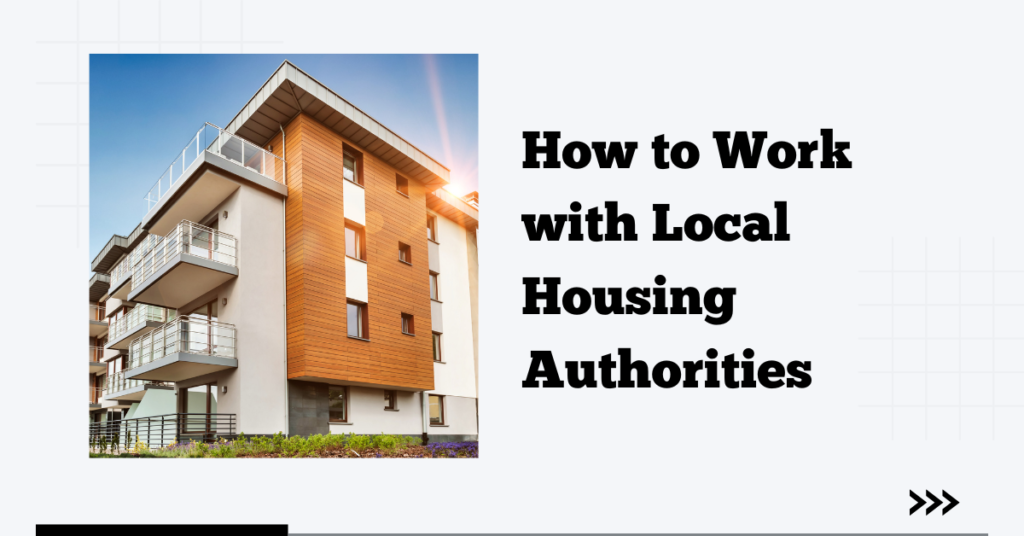Managing Section 8 properties successfully requires landlords to understand and follow the regulations set by local housing authorities (LHAs). These authorities are crucial for implementing the Housing Choice Voucher Program, ensuring compliance with federal guidelines, and providing a bridge between landlords and tenants. By fostering strong relationships and maintaining compliance, landlords can benefit from stable rental income and long-term tenant relationships. Below is a detailed guide to working effectively with LHAs.
The Role of Local Housing Authorities
What Do Housing Authorities Do?
Local housing authorities oversee Section 8 operations within their jurisdictions. Their responsibilities include:
- Distributing vouchers to eligible tenants.
- Conducting property inspections to ensure compliance with HUD standards.
- Processing monthly rental payments to landlords.
- Resolving disputes between landlords and tenants related to the program.
Why Are LHAs Important for Landlords?
By working with LHAs, landlords gain access to guaranteed rent payments and a steady pool of tenants. Understanding their processes helps landlords avoid delays and ensures a smooth rental experience.
Preparing Properties for Section 8 Compliance
Meeting HUD’s Housing Quality Standards (HQS)
HUD’s HQS guidelines are designed to ensure Section 8 tenants live in safe and habitable homes. Landlords must meet the following criteria:
- Functional plumbing, heating, and electrical systems.
- Properly secured doors and windows.
- Adequate ventilation and sanitation.
- Smoke detectors and other safety features.
Pro Tip: Use HUD’s HQS checklist for a pre-inspection review. Identifying and fixing issues ahead of time can help you pass the official inspection on the first try.
Scheduling and Passing Inspections
Once your property is prepared, the LHA will schedule an inspection. The inspector evaluates the property’s condition based on HUD’s safety and quality standards.
Inspection Focus Areas:
- Electrical and plumbing systems.
- Heating and ventilation.
- Overall safety and habitability.
Pro Tip: Respond promptly to any feedback or required repairs to avoid delays in tenant placement.
Navigating the Rent Determination Process
Understanding Fair Market Rent (FMR)
HUD determines Fair Market Rent (FMR) levels based on local property markets and unit sizes. Landlords must set their rent within these limits to qualify for the program.
Negotiating Rent with LHAs
If your property has unique features or is located in a high-demand area, you may negotiate for a higher rent. Documentation of these attributes, such as upgraded amenities or proximity to public transportation, can strengthen your case.
Pro Tip: Provide market comparables to support your rent request. This demonstrates the value of your property to the LHA.
Building Relationships with Housing Authorities
Effective Communication
Maintaining clear, professional communication with LHA staff can expedite processes and resolve issues efficiently. Whether you’re submitting documents or discussing inspections, clarity and respect go a long way.
Participating in Training Programs
Many LHAs offer training sessions for landlords to understand Section 8 requirements. Topics often include:
- Preparing for inspections.
- Tenant rights and responsibilities.
- Navigating lease agreements.
Pro Tip: Regularly attending these sessions helps you stay informed about program updates and regulations.
Maintaining Section 8 Compliance
Staying Current with Regulations
HUD and LHAs update their policies periodically. Staying informed about these changes helps avoid non-compliance penalties.
How to Stay Updated:
- Subscribe to LHA newsletters.
- Join landlord associations focused on affordable housing.
- Check HUD’s official website regularly.
Addressing Tenant Concerns
Quickly responding to tenant concerns, such as repair requests, fosters good tenant relationships and ensures continued compliance with HUD standards.
Pro Tip: Maintain detailed maintenance records to demonstrate your commitment to providing a safe and habitable property.
Preparing for Annual Inspections and Re-Certifications
Annual Inspections
LHAs conduct annual inspections to verify that properties continue to meet HQS standards. Preparation minimizes the risk of failing inspections.
Preparation Tips:
- Conduct regular property maintenance throughout the year.
- Address small issues immediately to prevent costly repairs later.
Re-Certification Process
Tenants are required to re-certify their eligibility annually. Landlords may also need to provide updated documentation, such as lease agreements.
Pro Tip: Keep your records organized to streamline the re-certification process.
Benefits of Strong Collaboration with LHAs
Reliable Rent Payments
LHAs provide financial stability by ensuring timely rent payments, even if tenants experience financial difficulties.
Reduced Turnover Rates
Section 8 tenants often seek long-term stability, resulting in longer leases and fewer vacancies for landlords.
Support and Networking Opportunities
Collaborating with LHA staff and other Section 8 landlords allows you to gain insights and best practices for managing your properties.
Read Also: Financing Strategies for Section 8 Investments
Conclusion
Collaborating effectively with local housing authorities is essential for landlords participating in the Section 8 program. By preparing your property, staying informed about policies, and fostering open communication, you can ensure compliance and maximize the benefits of this partnership. With the right strategies, Section 8 housing can be a reliable and rewarding investment.

